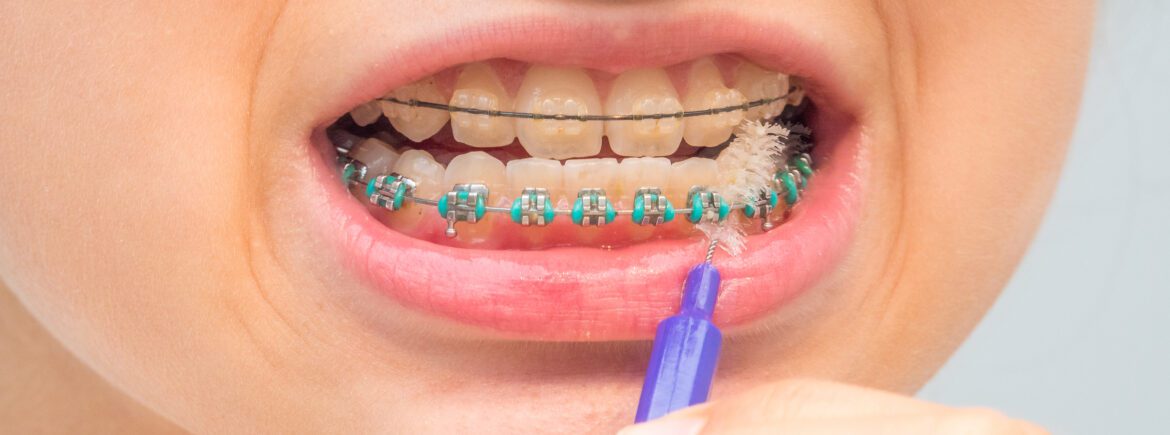Dental Braces and Oral Hygiene
Starting a journey with braces is a big step towards a great smile. In this guide, Our Perth Dentists will walk you through everything you need to know about different dental braces and how to take care of your teeth while wearing them. We’ll cover tips for keeping your braces clean, your teeth strong, and your smile bright.
Let’s dive in and make your braces journey as smooth and easy as possible!

Why Orthodontic Treatment?
Orthodontic treatment is more than just a teeth straightening method to achieve a perfect smile; it’s about safeguarding your oral health. When you choose to straighten your teeth with dental braces, you’re taking a big step towards preventing dental issues that can arise from crooked teeth.
Ignoring the need for braces may lead to complex problems in your mouth. Misaligned teeth can make cleaning difficult, allowing plaque and bacteria to build up, leading to decay.
Starting orthodontic care can make a significant difference. Regular visits to your South Perth dentist are essential for maintaining oral health and addressing any potential issues early. Remember, orthodontic treatment is not just about aesthetics; it’s vital to maintaining overall dental health.
Different Types of Dental Braces
Choosing the right type of teeth braces is essential for a comfortable and effective orthodontic journey. With various options available, it’s important to understand what each type offers. Whether you have crowded teeth or just a few slightly crooked ones, there’s a solution tailored to your needs.
Traditional Metal Braces
Traditional braces are a time-tested solution in orthodontic treatments. They consist of brackets and wires that work effectively to align your teeth. Ideal for a wide range of dental alignments, these braces are a go-to choice for many. Your dentist or orthodontist can guide you on how best to wear braces of this type for optimal results.
Lingual Braces
Lingual braces are similar to traditional ones but are placed on the back side of your teeth. They are a great option for those conscious about the appearance of braces. These braces are customized for each patient, offering a discreet way to straighten teeth.
Ceramic Braces
Ceramic braces blend in with your teeth’ colour, making them less noticeable than metal braces. They function just like traditional metal braces but with ceramic brackets, offering a subtle way to achieve a perfect smile.
Invisible Braces
Clear aligners, often made of thin plastic trays, are virtually undetectable. Clear aligners are custom-made to fit your teeth and are an excellent option for adults and teenagers. These trays gently move your teeth into the desired position and can be removed for eating and brushing.
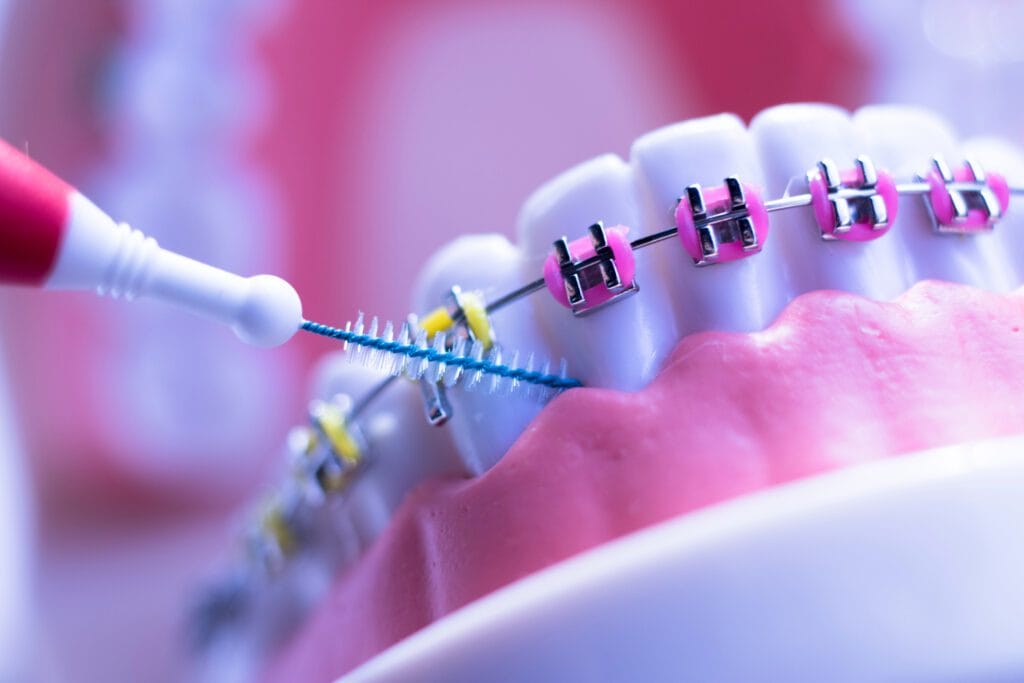
Dental Hygiene Challenges with Dental Braces
Orthodontic treatment can transform your smile but also brings unique challenges in maintaining good oral hygiene. With dental braces, care for your teeth and gums becomes more crucial. Let’s explore how to clean your mouth and maintain a healthy smile throughout treatment.
Dealing with Food Stuck in Dental Braces
Food getting trapped in brackets and wires is common. To prevent this, avoid sticky foods and certain foods that can cling to braces. Using an interdental brush can be a game-changer in removing food particles.
Avoiding Tooth Decay with Dental Braces
Braces can make your teeth more prone to tooth decay and cavities. Children, in particular, may face a higher risk due to less consistent oral hygiene practices and a tendency for a diet higher in sugars. This makes regular visits to a paediatric dentist especially important for young patients with braces.
Make sure you brush your teeth regularly with a soft-bristled toothbrush and fluoride toothpaste. Limiting the intake of sugary and acidic foods is important, as they can contribute to plaque formation and, therefore, tooth decay. Regular visits to your dentist and orthodontist are vital to monitor your dental health.
Keeping Gums Healthy While Wearing Dental Braces
Your gums need extra care during brace treatment. Brushing around the brackets with a toothbrush designed for braces and using interdental brushes for those hard-to-reach spots can keep your gums in top shape. Remember to visit your orthodontist regularly for check-ups.
Fresh Breath and Braces
Bad breath can be more prevalent with braces, as food particles often get trapped. Regular brushing, especially after meals, and rinsing your mouth can keep your breath fresh. Ensure you clean every part of your braces to keep your mouth fresh and healthy.
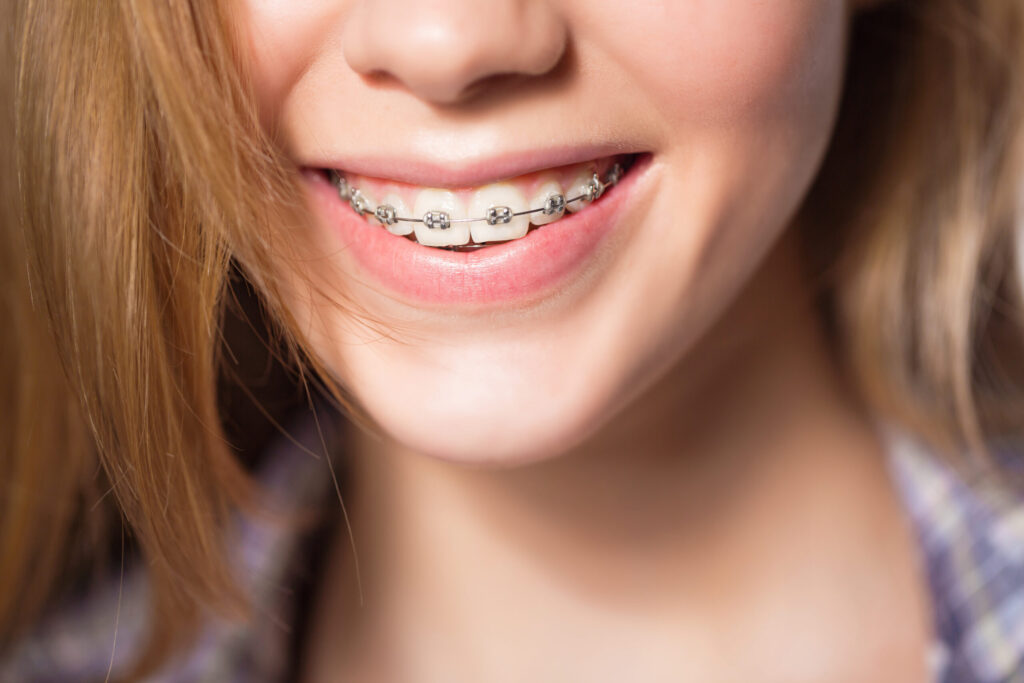
What to Do in Case of Breakage or Injury
In case of breakage or injury related to your braces, start by contacting your orthodontist immediately to schedule an appointment. They can guide you over the phone and advise if immediate attention is needed.
If you experience discomfort, use orthodontic wax to cover any sharp edges temporarily and minimize irritation. Avoid hard or sticky foods that could exacerbate the issue, and maintain your regular oral hygiene routine. If you have loose brackets or bands, leave them in place if possible, and bring any detached pieces to your orthodontist.
If a wire breaks or pokes you, gently reposition it with a blunt object or use wax to cover the sharp end. Do not attempt to cut the wire yourself. Finally, follow your orthodontist’s advice for repairs or replacements during your appointment to ensure your orthodontic treatment progresses smoothly.
Remember that addressing issues promptly can prevent complications and discomfort while keeping your orthodontic treatment on track. Regular check-ups with your orthodontist are essential to catch and address problems before they become serious concerns.
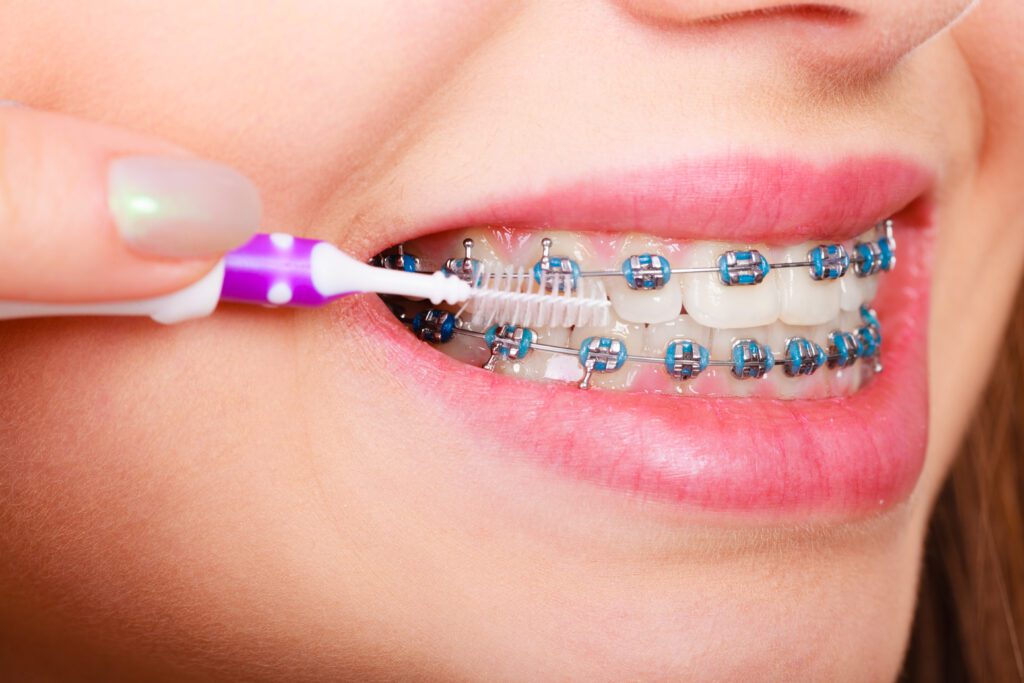
Effective Cleaning Techniques for Braces
Proper cleaning of your braces is crucial for maintaining oral hygiene.
Brushing:
Use a soft-bristle toothbrush or a special orthodontic toothbrush designed for braces.
Brush your teeth, using a small circular motion, after every meal and before bedtime.
Angle your toothbrush at a 45-degree angle to clean around the brackets and wires.
Brush the chewing surfaces, the fronts of your teeth, and the backs of your teeth.
Be gentle to avoid damaging the braces or wires.
Flossing:
Use floss threaders to pass dental floss under the wires.
Gently floss between each tooth and under the wires to remove food particles and plaque.
Clean the hard-to-reach areas with a water flosser or an interdental brush.
Remember: It can take extra time to clean your teeth thoroughly with new braces, so be patient and make it a habit. Don’t neglect your oral hygiene routine, even if it seems challenging at times.
Diet and Lifestyle Adjustments
While undergoing treatment, you might need to adjust your diet and lifestyle. Avoid chewing gum and other foods that can stick to or damage your braces. To reduce discomfort, focus on eating softer foods, especially in the days following adjustments. These changes help protect your brackets and wires, ensuring your treatment progresses smoothly.
The Importance of Regular Dental Check-ups
Visiting your orthodontist and dentist regularly is essential during your braces journey. These check-ups allow professionals to monitor your progress, make necessary adjustments, and ensure your oral hygiene is maintained. They are also opportunities to address any concerns you might have about your treatment.
Life After Dental Braces
After having your braces removed, it’s important to continue caring for your adult teeth to maintain the results. Regular brushing, flossing, and continuing to see your dentist are crucial. The journey to a perfect smile doesn’t end with braces; maintaining those results is a lifelong commitment to oral hygiene.
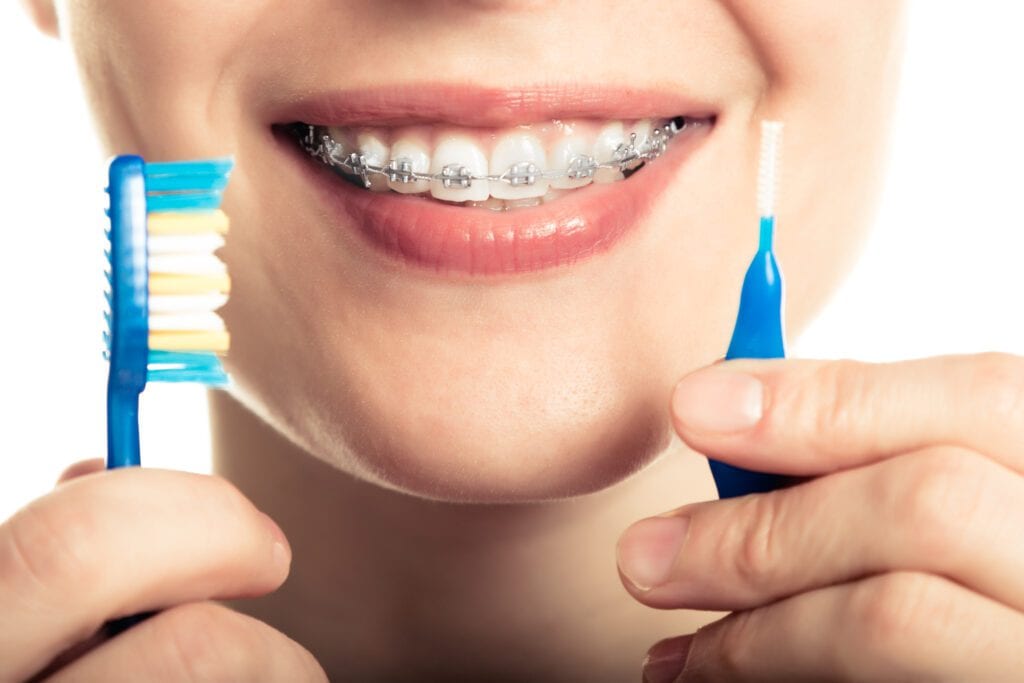
Frequently Asked Questions
What should I do if my braces cause sores in my mouth?
Use Orthodontic Wax: Apply a small piece of wax to any brackets or wires that are irritating your mouth. This provides a smooth surface and prevents further rubbing.
Rinse with Salt Water: Mix a teaspoon of salt in a glass of warm water and rinse your mouth to soothe sores and aid healing.
Keep it Clean: Regularly clean your braces and teeth to keep food particles from aggravating the sores.
How long will it take to see results from my braces?
Initial Changes: You might notice minor improvements in the first few months as your teeth begin to align.
Total Duration: Typically, braces need to be worn for 1 to 3 years, but this varies based on your individual needs and how well you follow your orthodontist’s advice.
Can I play sports while wearing braces?
Wear a Mouthguard: Always use a mouthguard when playing sports to protect your braces and your mouth from injury.
Choose Soft Mouthguards: Opt for a soft, flexible mouthguard that fits comfortably over your braces.
How often should I replace my toothbrush when I have braces?
Replace Regularly: Change your toothbrush every 3 months, or sooner if the bristles start to fray. Braces can wear out a toothbrush faster than usual.
What are the signs that my braces need immediate medical attention?
Severe Pain: If you experience intense pain that doesn’t go away with pain relief or adjustments made at home.
Broken Wires or Brackets: If any parts of your braces break or become loose, see your orthodontist immediately.
Allergic Reactions: If you notice unusual symptoms like rashes or excessive swelling around your mouth, contact your orthodontist.
Can I use whitening products while wearing braces?
Generally, No: It’s best to avoid whitening products while braces are on because they can lead to uneven colouring of your teeth.
Wait Until Braces are Removed: Consider whitening treatments once your braces are off for consistent results.
Are there any specific oral health risks associated with adult braces?
Gum Recession: Adults may be more prone to issues like gum recession. Maintain good oral hygiene and regular check-ups.
Root Resorption: In rare cases, the length of the tooth root can be shortened during treatment. Your orthodontist will monitor this.
How do I handle an emergency situation with my braces when traveling?
Carry a Basic Kit: Include orthodontic wax, a small mirror, and tweezers to manage minor issues.
Keep Your Orthodontist’s Contact Information: Have your orthodontist’s phone number handy in case you need advice.
Know Where to Go: Find out about dental services at your destination in case of emergencies.
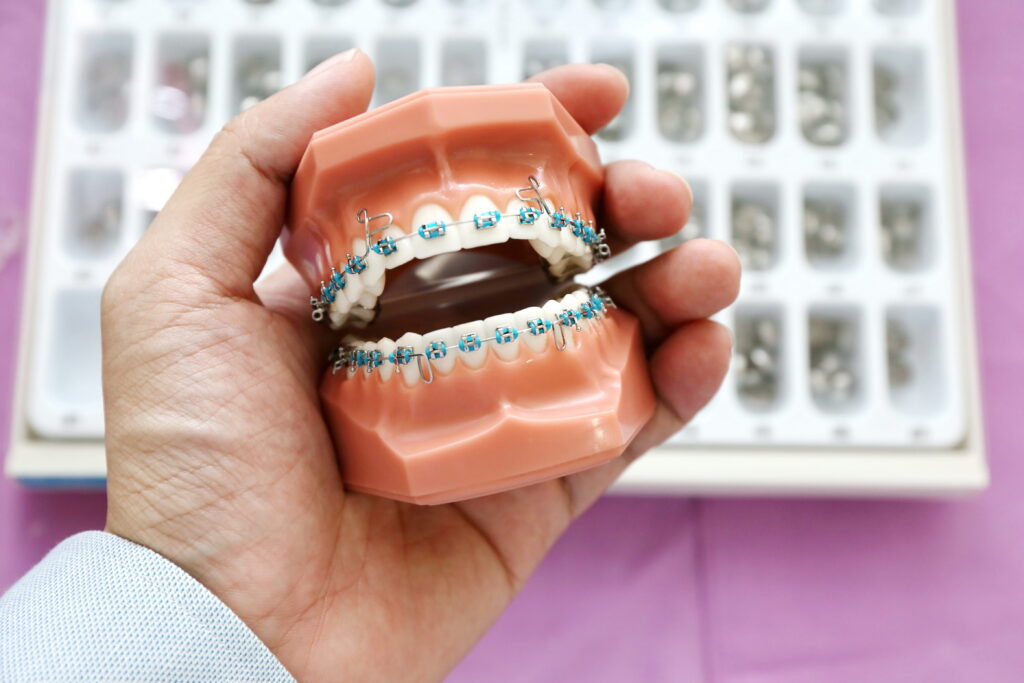
Acts Dental: Your Dental Health Partner
At Acts Dental, we’re more than just a clinic; we’re your partner in achieving and maintaining excellent dental health. Our dedicated dental professionals and orthodontists are committed to providing the highest quality care to our patients.
We believe in building a relationship based on trust and understanding, ensuring every visit is comfortable, informative, and tailored to your unique dental needs. Our dental clinic in Perth is a Medibank preferred provider, HBF preferred provider, NIB preferred provider, HCF preferred provider, and Bupa preferred provider dentist in Perth. Therefore, our patients can benefit from higher rebates and transparent treatment costs.
Whether you’re coming in for a routine check-up, wisdom teeth removal in Perth, emergency dental care, or orthodontic treatment, you can count on us to be your guide and ally on your journey to a healthy, beautiful smile. Call us at (08) 9474 5083 or book online.


